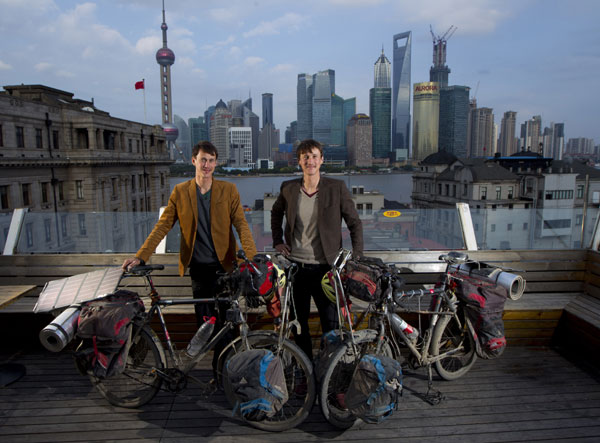A two-wheeled pilgrimage to the East
Updated: 2012-11-18 08:03
By Zhang Kun in Shanghai (China Daily)
|
|||||||||||
|
German twin brothers Paul and Hansen Hoepner have made their crazy idea of cycling from Berlin to Shanghai come true. Gao Erqiang / China Daily |
It was Paul and Hansen Hoepner's dream to travel by bike to a far and distant land. The German twin brothers checked the map and discovered that from their home in Berlin, the farthest they could reach by bike was Shanghai, China.
"It's the longest way you can go without crossing any ocean," says Hansen Hoepner, 30, who specializes in bicycle design. "We just wanted to go as far as possible."
He is just minutes older than Paul.
Paul used to work as a website designer, and is now studying a post-graduate program on human factors at the Institute of Technology in Berlin.
To many, the bike trip sounded like a crazy idea since they didn't have the money, equipment, or even legal permission for the trip. But all that did not stop them. As identical twins, their brains worked like a single computer on the project.
And there was another compelling reason for the trip: their great grandfather was a sailor and used to travel between Europe and Asia. "We still have the wall carpet from China, with dragons on gold and red silk. Maybe there is Chinese blood in our family?" Paul says.
To finance their dream, they moved in together, taking part-time jobs in a bar and successfully got funding and sponsors. On their birthday on April 6, they set out from their home and finally made it to Shanghai on Oct 28.
They have recorded all their adventures and struggles, happiness and distress, their experiences in deserts and the Himalayas, on their blog www.berlin2shanghai.com, which also contains videos and photos of their journey.
"We want to make a multi-media road trip book which represents two perspectives: Hansen's and Paul's," write Hansen and Paul.
In total, they traveled 13,600 km in 207 days, passing through the Himalayas, the Taklimakan desert, and traversing seven countries: Germany, Poland, Belarus, Russia, Kazakhstan, Kyrgyzstan and China.
After the first few days of warming up, they covered more than 200 km a day. It was a lonely journey, and the Hoepners only exchanged a few simple greetings with the locals without really getting to know people. The translation application on their iPhone helped in making themselves understood.
Relating an interesting experience in China, Hansen says when they were near Yichang, Hubei province, they ran out of cash, and were disappointed that the only bank they could find was closed. It was a cold and rainy evening and they were exhausted, wet and hungry. They decided to trade some of their emergency dollars for Chinese cash.
"But nobody wanted our dollar," Hansen recalls. "No one recognized the dollar bill, nor did they know what to do with the foreign money. Nobody was willing to take it.
"Then someone asked, 'How much do you need?' and instead of exchanging the dollar, he simply offered us money," he says. A small crowd gathered and more people inspired by the first man's generosity, gave them money. They received 350 yuan ($56) altogether.
The trip that lasted more than six months took a lot of planning. After limiting their daily expenses, they were still short of 9,000 euros (71,315 yuan), so they went for "crowd funding".
"It's like begging on the Internet," Hansen explains. They posted their project on their website, and asked people for support. Those who liked their idea, and wanted to help realize it, donated. After a limited time, they received the money needed to start the journey.
The twins successfully collected 9,003 euros in 40 days, and they convinced various companies to sponsor their bikes, helmets and other equipment.
Hansen and Paul lost some weight during the journey, and the experience changed them profoundly.
"It was like a pilgrimage - the journey itself was the goal," Paul says. Riding long hours in the wilderness, they had plenty of time to stay still and think. "We are glad we made the psychological investment. I believe we will feed on it in the long future," Hansen adds.
zhangkun@chinadaily.com.cn
Today's Top News
Rescuers race against time for quake victims
Telecom workers restore links
Coal mine blast kills 18 in Jilin
Intl scholarship puts China on the map
More bird flu patients discharged
Gold loses sheen, but still a safe bet
US 'turns blind eye to human rights'
Telecom workers restore links
Hot Topics
Lunar probe , China growth forecasts, Emission rules get tougher, China seen through 'colored lens', International board,
Editor's Picks

|

|

|

|

|

|






